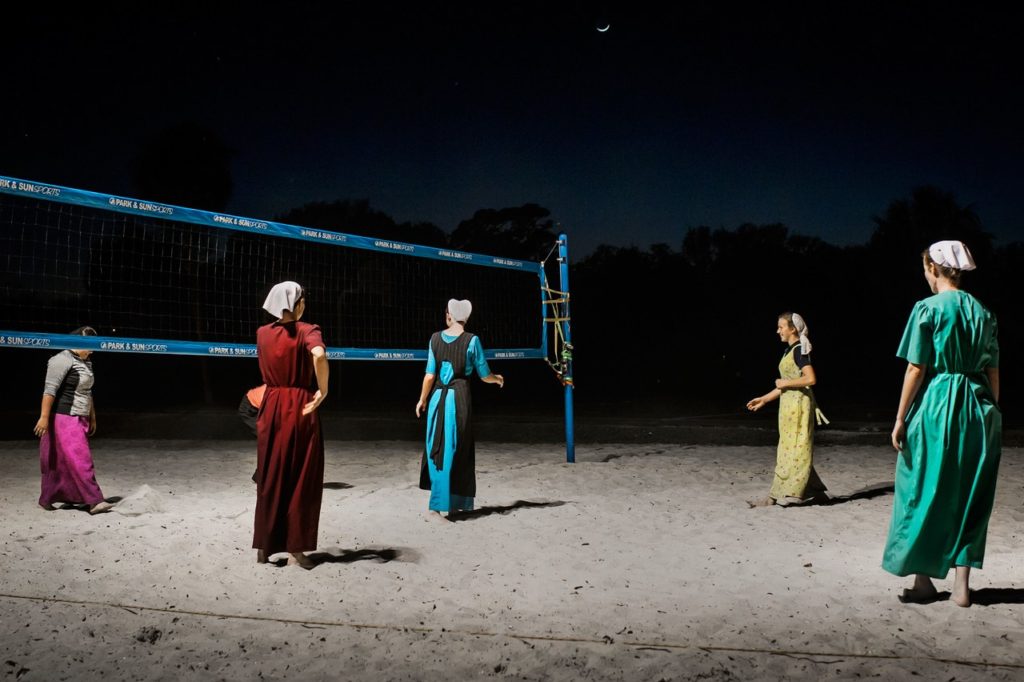In the News: From Witchblr to Salinger
A round-up of recent religion news.
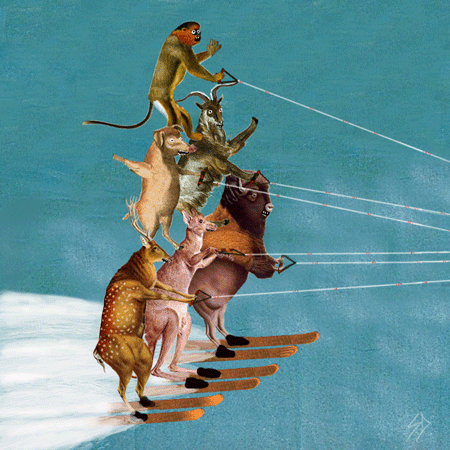
Gif by James Kerr
We’ve been busy around here lately, so our roundup this week is short, if not very sweet.
First up, reading the news, it can be hard to keep in mind, but let’s take a minute or two to remember what the FBI is about, yeah?
Lerone A. Martin wrote about how New Documents Reveal How the FBI Deployed a Televangelist to Discredit Martin Luther King in Religion & Politics
In an FBI memo following the historic March on Washington, the FBI labeled King “the most dangerous and effective Negro leader in the country” and the nation’s top domestic security risk. The bureau had no evidence that King was a communist; in fact, the FBI concluded King and the civil rights movement he led were too religious to be influenced by communism. Contrary to the evidence, though, Hoover persisted in believing King had fallen under the influence of godless communism. King was leading the nation “in a form of racial revolution,” so he had to be stopped. On the same day the memo was drafted, the FBI sought Michaux’s help. The evangelist immediately launched a coordinated public critique against King and the gospel the civil rights minister preached. Michaux preached a radio sermon from the nation’s capital on CBS Standard and FM radio affiliates. The homily opposed the March on Washington and King’s historic “I Have a Dream” speech. Michaux used the Lord’s Prayer from the Gospel of Luke as his sermon text, proclaiming that King’s dream of racial equality would only materialize when God’s rule was established in the hearts of men. “Yes, righteousness will flow like a mighty stream,” Michaux said, quoting King. However, he qualified, it would only happen “when the kingdoms of this world become the Kingdom of our Lord and Savior, Jesus Christ—but not until then according to God’s Word.” Advocating for legislative change was futile, according to Michaux; changing hearts was the only way to bring about racial equality. He closed the sermon by telling his listeners to cease marching and simply “seek to do the will of God and be blessed.” It was one thing to hear this from white evangelists like Billy Graham, but it was a weightier matter to hear it from a pioneering black cleric.
And Alia Malek reported on The FBI’s ‘Vulgar Betrayal’ of Muslim Americans forNYR Daily
Boundaoui pieces together the truth that, indeed, her small neighborhood was the target of a secret FBI counterterrorism probe codenamed Operation Vulgar Betrayal, led by a particularly zealous FBI agent. But she still doesn’t know many of the specifics, including why the probe was opened and whether it ever ended. But while she connects Vulgar Betrayal to a long history of FBI surveillance of communities of color, the aim of the film is not a comprehensive look at this history or even that of US surveillance of Arab and Muslim Americans, which predates September 11 by decades. It could hardly be Boundaoui’s responsibility to address, in 86 minutes, all the lacunae in that story.
Instead, in Boundaoui’s film, she offers up herself and her charismatic siblings and mother as a way to draw attention to what was done to people who are not the menacing, terrorist sympathizers of the public imagination—a family that appears, in fact, utterly normal. In addition to investigating Vulgar Betrayal, Boundaoui burdens herself with trying to correct how many Americans perceive American Muslims: breezy scenes of her and her friends roller-skating, eating cupcakes, and taking selfies at joyous Eid celebrations and picnics seem consciously included, an indictment more of how unfairly these communities have generally been portrayed.
While we’re on the subject, also have a look at the editors of The Immanent Frame on The Muslim Ban and Academia
The Muslim Ban—in its current iteration as Proclamation 9645 and in its earlier forms—is certainly an egregious attack on the values of our academic communities, but it is not a novel one. Restrictions on scholarship and scholars tied to immigration policy targeting Muslims as threats to national security, as well as to sanctions on Muslim-majority countries uncooperative with US foreign policy interests, have had an enduring presence in recent US history. From interrogations at the United States border faced by Muslim scholars attending workshops and conferences, to outright denials of visas to travel to the United States, to the inordinate amount of red tape at the Office of Foreign Assets Control in order to carry research funds to sanctioned countries, a culture of intimidation has deeply damaged the United States’ place as a forum for free academic inquiry and exchange.
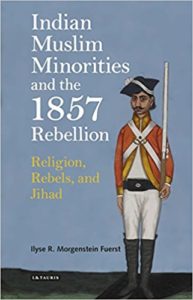 SherAli Tareen interviewed Ilyse Morgenstein Fuerst about her book Indian Muslim Minorities and the 1857 Rebellion: Religion, Rebels and Jihad for The New Book Network. Morgenstein Fuerst was one of our fantastic panelists at the event, “Being Brown: Race, Religion and Violence in Trump’s America,” held last month at NYU’s Center for Religion and Media and organized by Simran Jeet Singh (interviewed in this month’s issue). You can watch a video of the event here.
SherAli Tareen interviewed Ilyse Morgenstein Fuerst about her book Indian Muslim Minorities and the 1857 Rebellion: Religion, Rebels and Jihad for The New Book Network. Morgenstein Fuerst was one of our fantastic panelists at the event, “Being Brown: Race, Religion and Violence in Trump’s America,” held last month at NYU’s Center for Religion and Media and organized by Simran Jeet Singh (interviewed in this month’s issue). You can watch a video of the event here.
In her fascinating and path paving new book, Indian Muslim Minorities and the 1857 Rebellion: Religion, Rebels and Jihad (I. B. Tauris, 2017), Ilyse Morgenstein Fuerst, Assistant Professor of Religion at the University of Vermont reorients our understanding of the 1857 rebellion in India, while offering a nuanced theorization of religion, religious identity, and questions of violence. The title of this book announces the key terms and conceptual pillars that sustain it throughout: religion, rebels, and jihad. The brilliance of this book lies in the way it raises and addresses a number of critical questions regarding memory, formations of religious identity, and conceptions of religion as a category through the close and energetic reading of a single event. This book is intellectual history at its fiercest. Nimbly written, it will also make an excellent text for undergraduate and graduate seminars.
Out of the Indian past and into the Indian present: Cards Against Sanskaar: An Indian version of Cards Against Humanity is here to offend you by Manali Shah for the Hindustan Times.
In a country where people are quick to claim hurt sentiments, such a game is sure to ruffle a few feathers. But Das and her friends are ready to go all in. “While writing the cards, at times, we did think whether something was very offensive, and if we should shy away from mentioning names of companies and individuals. But the entire appeal of Cards Against Sanskaar is that nobody is spared.” They have also lawyered up, should trouble arise.
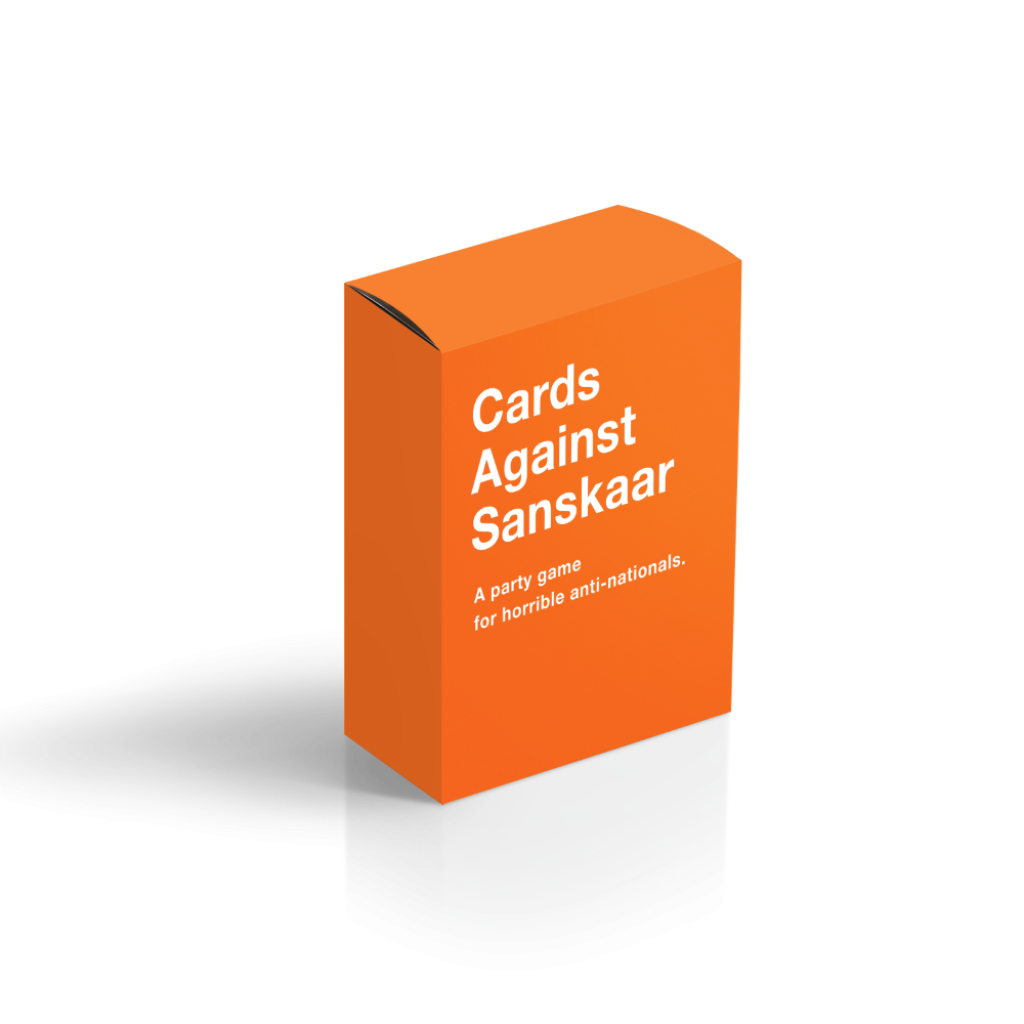 And while we’re on the subject of repugnant ideology, Pankaj Mishra wrote about Jordan Peterson & Fascist Mysticism by Pankaj Mishra for the NYR Daily
And while we’re on the subject of repugnant ideology, Pankaj Mishra wrote about Jordan Peterson & Fascist Mysticism by Pankaj Mishra for the NYR Daily
Peterson may seem the latest in a long line of eggheads pretentiously but harmlessly romancing the noble savage. But it is worth remembering that Jung recklessly generalized about the superior “Aryan soul” and the inferior “Jewish psyche” and was initially sympathetic to the Nazis. Mircea Eliade was a devotee of Romania’s fascistic Iron Guard. Campbell’s loathing of “Marxist” academics at his college concealed a virulent loathing of Jews and blacks. Solzhenitsyn, Peterson’s revered mentor, was a zealous Russian expansionist, who denounced Ukraine’s independence and hailed Vladimir Putin as the right man to lead Russia’s overdue regeneration.
Need a vacation? Check out Where the Amish Go on Vacation by Alice Gregory with photography by Dina Litovsky for the New Yorker
Each winter, for close to a century now, hundreds of Amish and Mennonite families have travelled from their homes in icy quarters of the U.S. and Canada to Pinecraft, a small, sunny neighborhood in Sarasota, Florida. Arriving on chartered buses specializing in the transportation of “Plain people” from areas such as Lancaster, Pennsylvania, and Holmes County, Ohio, they rent modest bungalows and stay for weeks, or sometimes months, at a time. It’s vacation. For many, it’s the one time of the year that they spend with people from communities other than their own.
And you might as well bring a book with you on your trip. Maybe Todd Berzon’s Classifying Christians reviewed by Jennifer Barry in the Marginalia Review of Books. (You can read an excerpt here.)
The current political climate in the United States attests to an increasingly potent form of social control through categorization, labeling, and attempts to pack neatly groups of people into one category or another. Fear mongers and political pundits attempt to do this by defining America against a negative, against what they claim it is not. These types of ethnographic divisions and cultural boundary markers are familiar, and they are increasingly divisive. Scholars of early Christianity are trained to keep an eye out for this type of politically expedient boundary-marking because early Christianity is precisely a movement that defined itself against what it is not, at least in the eyes of a few late ancient pundits. Heresiologists— early Christian writers who call attention to and sort out “heretics” who lead Christians astray through willful error — remain an integral part of an early Christian narrative. Texts produced by heresiologists have long functioned as a field guide for identifying, sorting, and excluding deviant forms of Christianity. In the process, these same men who try to preserve one form of Christianity have also served as gateways to understanding its alternate forms.
In his recent monograph, Classifying Christians: Ethnography, Heresiology, and the Limits of Knowledge in Late Antiquity, Todd Berzon performs a clever ethnographic study of the making and enforcing of Christian orthodoxy through heresiological literature. In this book, he assembles a familiar cast of characters such as Irenaeus of Lyons, Tertullian of Carthage, and Augustine of Hippo – familiar but perhaps not exhausted sources for understanding new insights about the history of Christian orthodoxy.
Or you could check out books by Leslie Jamison and Jamie Quatro in conversation here About Parenting, Faith, and Intoxication at Literary Hub.
When the intersection between illicit sex and religion reared its head again, I realized that it, too, was a topic I was going to have to plumb in all of its terrifying depths. Terrifying, in part, because of the current socio-political moment. It’s a bizarre time to be writing about anything related to religious thought, with so many “Christians” supporting the administration of an insane racist misogynist. The far-right has hijacked the language, eradicated all the nuance… really, they’ve all but irreparably damaged what is beautiful and historically compelling about the Judeo-Christian faith. Even simple words like “prayer” have been sullied by the “our prayers are with the victims and their families” posts after yet another mass shooting. “Prayers” from officials who cow to the NRA and won’t enact gun control legislation.
While the tendency might be to avoid literature that still engages with faith, I believe the current moment is a crucial one in literary history for artists of faith who don’t identify with the far-right, who recognize complexity and doubt as the marks of spiritual viability. We must become voices crying in the wilderness of contemporary American evangelicalism (though I hate to use that lovely 1530s word in its tainted context): but that isn’t Christianity. That is a perversion of it. Now more than ever, artists across mediums must commit to forging a new language for the ineffable. How do I tell this story without employing the very words that have been used to pervert it?
And Sasha Von Oldershausen‘s piece on ‘Franny and Zooey’ in Iran for The Paris Review.
In classic Iranian New Wave fashion, Mehrjui’s visual retelling of Salinger’s stories is allegorical and poetic. He uses symbolism to translate the incisive and dialogue-heavy characterizations for which Salinger is famous. Due to the Islamic regime’s rules about the expression of modesty, Mehrjui could not shoot his Zooey character steeped in a bathtub, as he appears in Salinger’s work, and so the director explores the symbolic potential of water and submersion elsewhere. The film opens with a waterlogged dream sequence in which Pari, the Iranian Franny, is forced underwater by a band of her classmates. In the book, Franny only mentions the dream in passing. In the film, it sets the tone, and the perpetual symbol of murky water recurs throughout.
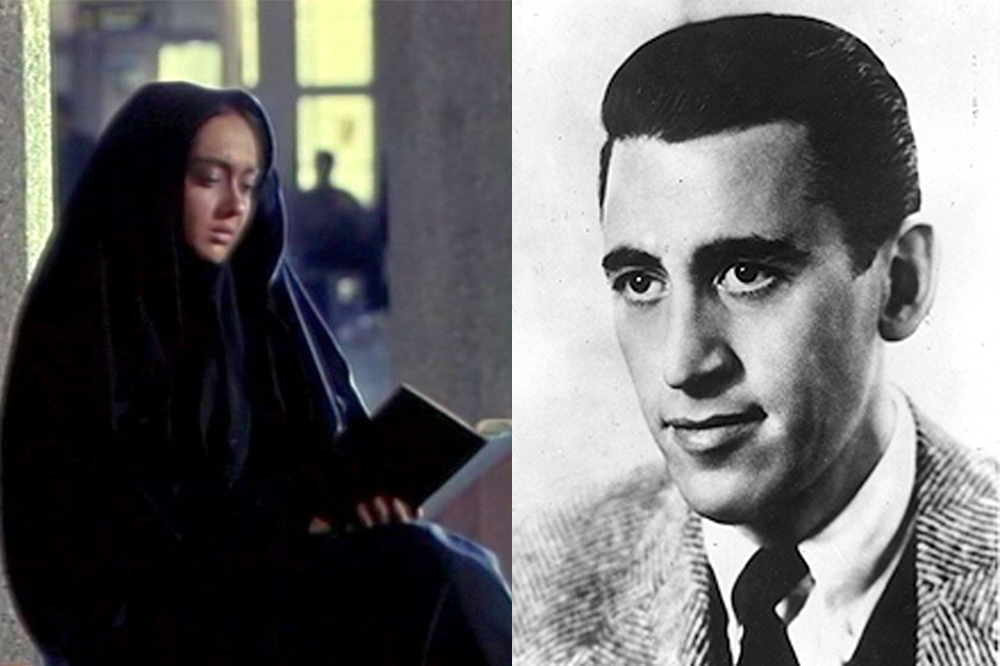
ansa – salinger – Una foto di J. D. Salinger, l’autore del Giovane Holden in una foto di archivio. ansa
But do beware of who’s paying for your trip; Sarah Seltzer reports on Birthright Israel and #MeToo for Jewish Currents
As the #MeToo movement unfolded, Jewish Currents spoke with more than 50 Birthright Israel participants and staffers about their experiences with the often-fraught sexual and gender dynamics on the trips, uncovering the case above along with eight other alleged incidents of sexual misconduct ranging from verbal harassment to assault. The participants and staffers told us about a volatile mix of sex and alcohol that, as on college campuses, has the potential to turn toxic. In the cases of some incidents recounted to us, it did.
But many spoke of something more: a pervasive environment of sexual pressure that encourages Jews to meet, marry, and, someday, procreate with other Jews while being awed by the beauty and culture of Israel. This expectation is communicated before the trip even begins by official social media, and on the trips is expressed most directly around American women and Israeli soldiers.
Lastly, you know we’re suckers for a good essay on Internet witches, and Emma Gray Ellis‘ latest in Wired, Witches, Frog-Gods, and the Deepening Schism of Internet Religions, is definitely a good one.
The internet giving birth to new religions, or new versions of existing religions, is just another sign of it becoming a real place. But what ties Witchblr and the Cult of Kek together, despite their diametrically opposed viewpoints, is that each is dissatisfied with the real world and their inability to change those circumstances, and thus each has created its own sheltering cosmology. Followers of both send violent or violence-connoting images to their enemies (who are, at least in part, each other). And because each seems to comprise a mix of ironic and genuine believers—and because the internet is overrun with that nihilistic, post-truth “lol nothing matters” point of view right now—each has the potential to be a little dangerous. And that makes them hard to know what do with.
And that’s all for this month. See you again soon!


